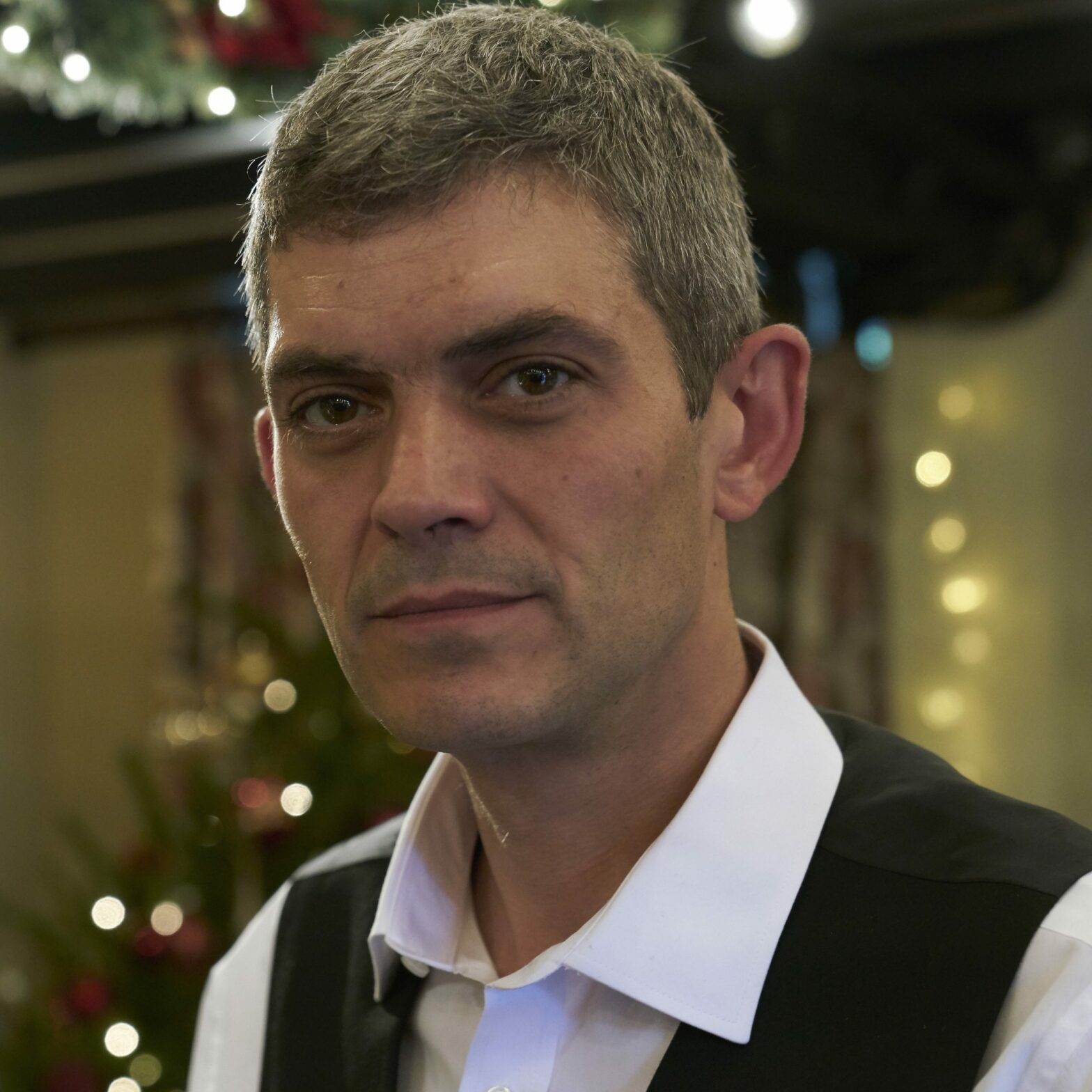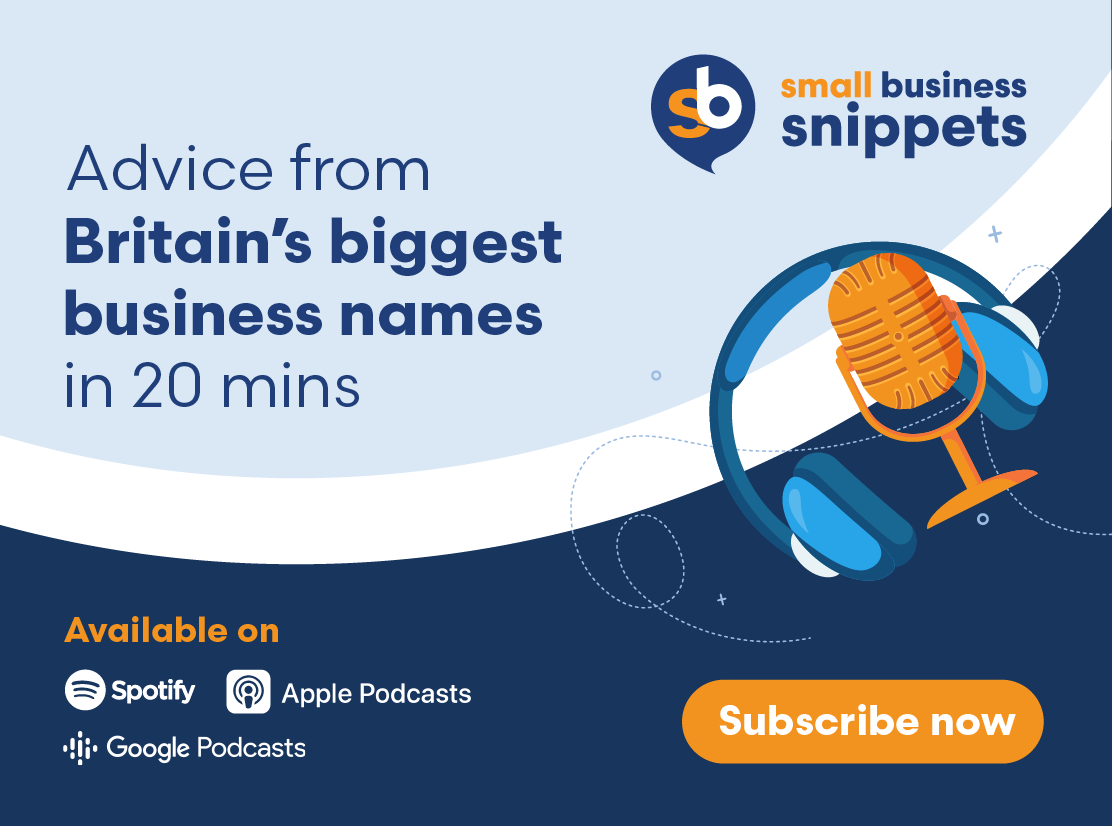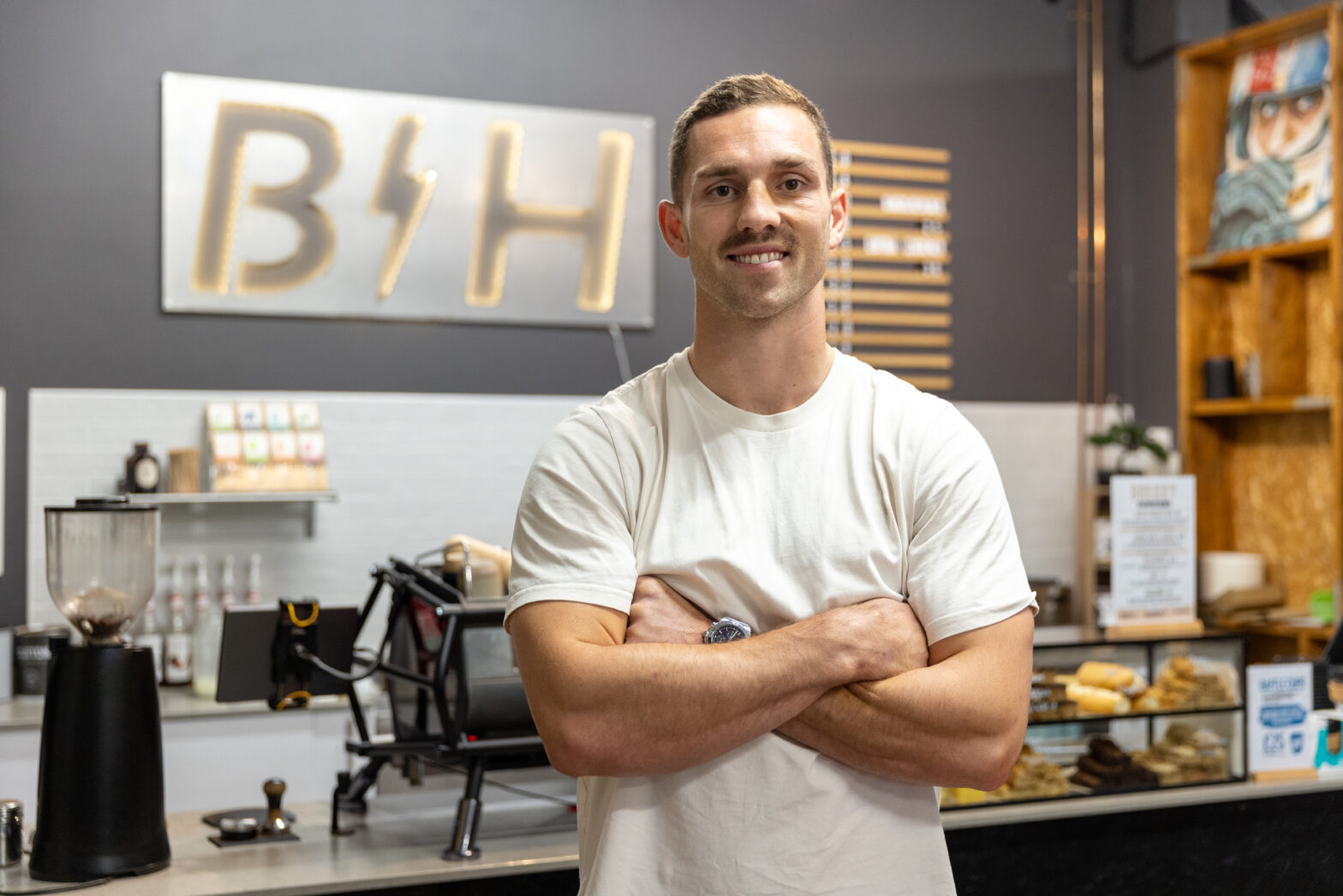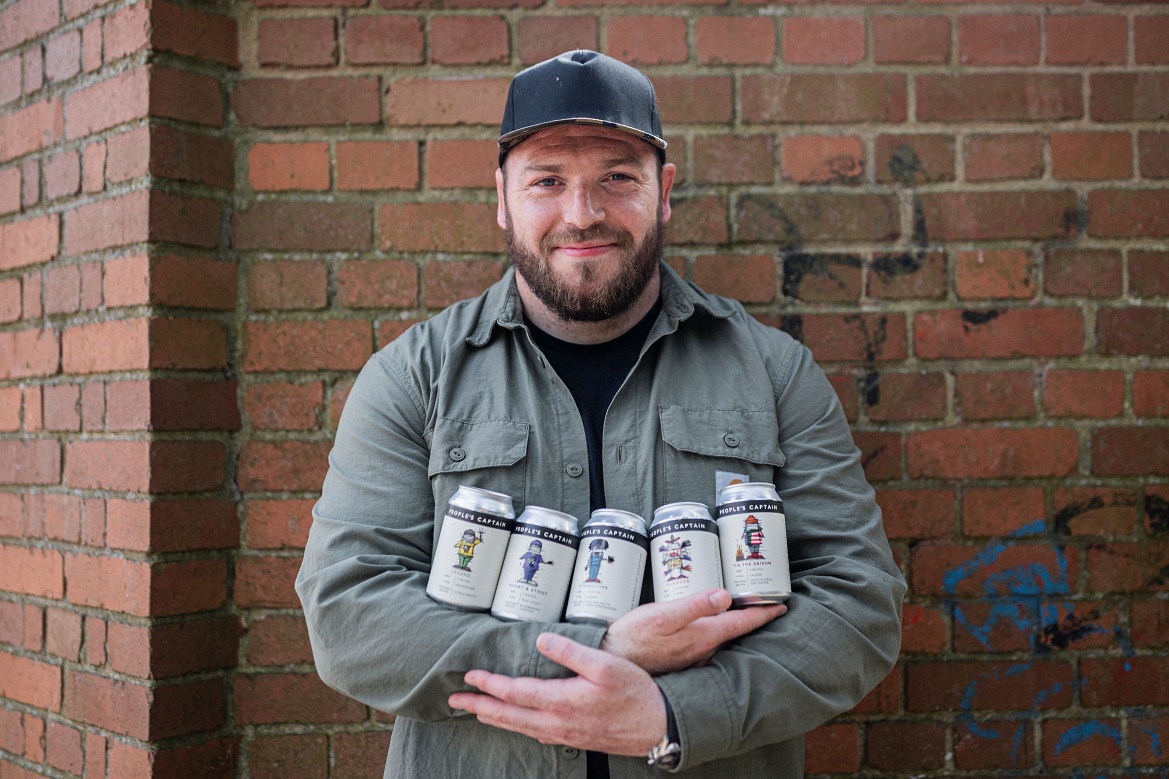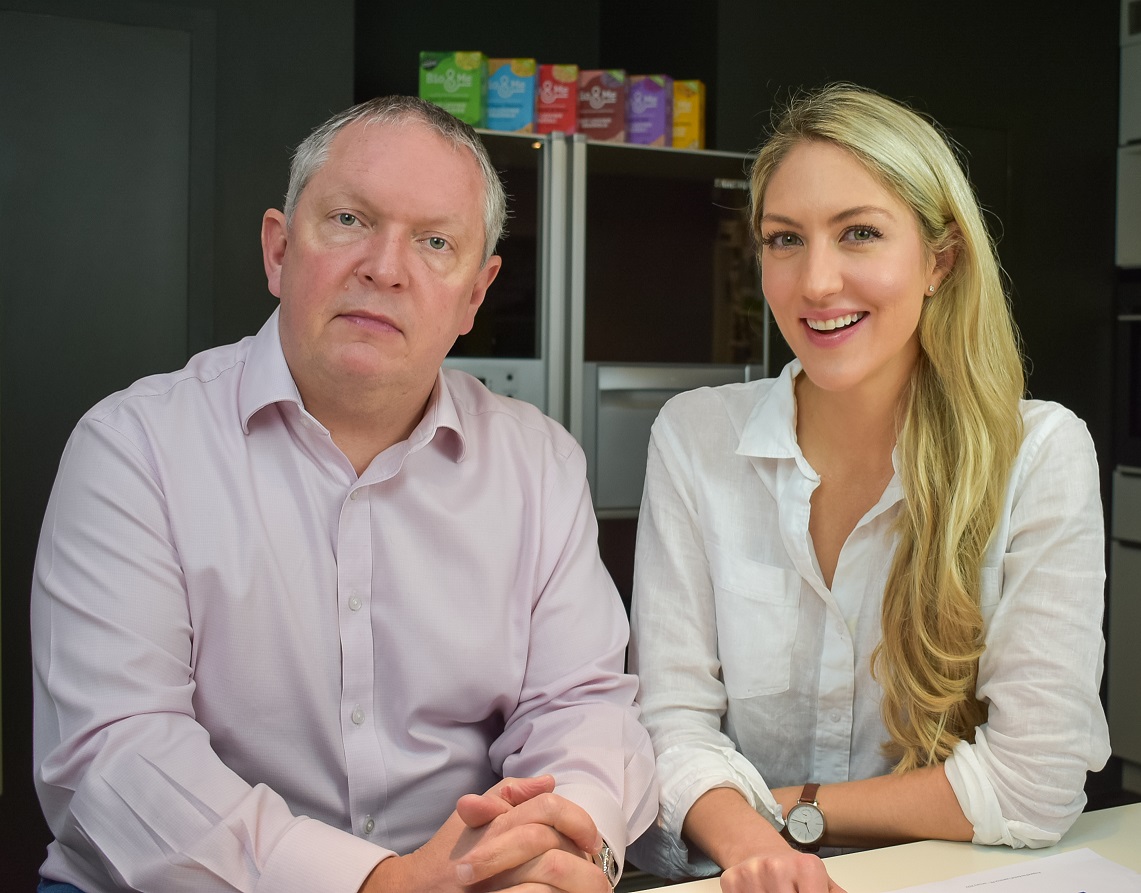Welcome to Small Business Snippets, the podcast from SmallBusiness.co.uk. Today’s guest is Merlin Griffiths, pub owner, mixologist and bartender on Channel 4’s First Dates.
We discuss current difficulties in the hospitality industry and how you can cut your costs.
We’ve paired up with Smart Energy GB to bring you this episode.
Listen to it in the media player below.
You can also catch our episodes with:
- Founder and chairman of Pimlico (formerly Pimlico Plumbers), Charlie Mullins
- Retail expert and former Dragon, Theo Paphitis
- Author and boardroom expert, John Tusa
- Digital guru and investor, Sherry Coutu
- Entrepreneur and former Dragon, Rachel Elnaugh
- Businesswoman and Dragon, Deborah Meaden
- Entrepreneur and The Apprentice 2005 candidate, Tim Campbell
- Gousto CEO, Timo Boldt
- Entrepreneur and The Apprentice 2018 candidate, Jackie Fast
- Investor and former Dragon, Piers Linney
- Investment fund manager, Nicola Horlick
- Supermodel turned entrepreneur, Caprice
We’ve got podcast episodes from the first series looking at:
- How one business owner’s mental breakdown caused her to see trolls from her past
- How one entrepreneur hired a videographer to track their every move and build their business brand
- How funding a business led one entrepreneur to stress-related alopecia
- One entrepreneur’s first professional public speaking engagement
- Adapting to UK life and learning English before starting a business
- Securing seed funding
- Finding the perfect head of customer care
- Reaching a £1 million annual rate of return
- Boosting client numbers from 30 to 850
- Starting a brand new business from scratch
To find out more about Small Business Snippets, you can download the trailer.
If you want to listen to the podcast elsewhere, it’s available on iTunes, Google Podcasts, SoundCloud and Spotify. It’d also be great if you could leave us a review and subscribe.
Remember to like us on Facebook @SmallBusinessExperts and follow us on Twitter @smallbusinessuk, all lower case.
Would you prefer to read Merlin Griffith’s podcast interview instead?
Hello and welcome to Small Business Snippets, the podcast from SmallBusiness.co.uk. I’m your host, Anna Jordan.
Today we have Merlin Griffiths, pub owner, mixologist and bartender on Channel 4’s First Dates.
Merlin grew up in Cheltenham, Gloucestershire. He used to own the Priory Tavern in north west London, with his wife, Lucille. These days he runs Maltsters Country Inn, located in Badby.
Cocktails are a staple speciality on Merlin’s menus as he’s been a bartender and mixologist for 20 years.
He first appeared as the bartender on First Dates in 2013 and the show is currently on its 14th series.
We’ll be finding out a bit more about him as well as the challenges facing the hospitality industry.
Anna: Hi Merlin.
Merlin: Hi Anna, thank you for having me. How are you doing?
Anna: Of course – I’m doing very well, thank you. How about you?
Merlin: Yeah, yeah, all things considered, well, I think, yeah.
Now, many of our listeners would recognise you as the man behind the bar on First Dates. Tell us more about how you got into the hospitality industry and then onto the show.
Merlin: Hospitality – what a trade to be in! It’s one of those things, isn’t it? Do you plan to go into hospitality? Some people do they really do? I don’t think I did.
I was quite young, when I first started working as what we call a barback, up in the West End of London. I think I lucked out by getting into the right bar at the right time. This was just as that cocktail renaissance was starting to happen in the mid-90s. Yeah, for me, I mean, it was one of my first jobs in London. I was just happy to have a job really, to work all hours all days or, yeah, do just about anything necessary. You know, it wasn’t probably until about five or six years in and you start going, ‘I’m still doing this?’ This is more than just a stopgap of a job, isn’t it? Yeah, I think this is now officially a career. And yeah, that’s where it’s led to now via corporate money.
I had a good stint working for five-star hotels out in India for Taj hotels. I was living in Bangalore for a good while. From there, I was headhunted into Bacardi Global, as one of their global ambassadors for Bombay Sapphire gin and Oxley gin at the time. That was a great experience – almost four years bouncing around the world teaching people how to make martinis and from there into pub ownership. It was at that point where we suddenly thought, my partner and I, we’ve been looking at this, and especially on my travels – I’ve been in America loads – I have this idea that a good American neighbourhood bar, you can still get a really well-made Cosmo or Margarita as well as decent draft beer. And I had this idea that why can’t you do the same in a sort of a British pub setting, you know, the cocktail side of things, the drink side of things shouldn’t really be mutually exclusive. Cocktails and cask ales, quite literally. So that’s sort of where we started cocktails and cask ales and no screens and no machines, because I decided there were enough TVs in pubs at the time as well. Pubs should be sociable. And so that’s what it led to that.
And it was while doing that, there was a job advertisement for Channel Four. They were looking for a bartender. That’s it, it was literally advertised as a job and I was like, ‘Okay, I think I could pull out a small amount of time to have a go at that too’. And I was lucky enough to land it – it’s a fantastic role which I’ve really, really enjoyed.
Just out of curiosity, how do you get headhunted as a barman? What kind of things are they looking for and who approaches you?
It’s an odd one, you see, because the social media side. You go online these days and you can find loads of really good bartenders up and down the country and all around the world. There’s a really developed network nowadays. But we’re going back ten years and it wasn’t as developed as we know it now.
For me, moving into the job of First Dates, for instance, I was very lucky thanks to the Bacardi Global support. I’ve done a whole bunch of videos of online training and bits and bobs for them at the time. If you if you literally just search ‘find me as a cocktail bartender’, there were about three pages of me making nice and dry martinis, and Tom Collins [cocktails] and so on and so forth. So really, I think, you know, a certain amount of luck, but at the time. These days, you really have to work hard for it.
Anna: I imagine it’s not just the showy, throwing bottles over your shoulder and setting things on fire, either.
Merlin: No, but that’s also fun. Obviously, I was never much of a flair bartender. For me, it always has been about customers and customer service. That’s the real key for me as a people business. And I’ve always said that. The clues in the name hospitality: we’re hospitable. And that’s genuinely what we get up to here. It’s not about how well can you can mix a martini or how well you can keep your cask ale, all of that. At the same time though, what’s really important is how you deal with people, I don’t like to use the word customers – ‘guests’ is better. You know, how you deal with your guests, who become friends as well, your local community, especially in the pub game.
There is loads to think about when it comes to running a pub. When you took on Maltsters, it was in pretty bad shape when you took it on. How did you turn it around without blowing your budget?
Merlin: Slowly but surely, evenly divide the task up piecemeal, otherwise these places can become. Anyone who’s taken an old pub or an old, an old tumble-down pub. Why call nil-premium size, anyone who’s done that journey knows what I’m talking about, when you have to divide up the task because otherwise it can become overwhelming. Unless you’ve got unlimited budgets and contracts as to throw it all in one big hit, which let’s face it, most of us don’t. I know that at small business level we tend to sort of bootstrap our way up.
First things first, yes, I’m going right what obviously, I need to get the kitchen, clean, comfortable, hygienic. Once you do that, we need a basic bar and trade area. So they’re the first two things you look at, then we start looking at upgrading the function room, then we start looking at doing the gardens, then we can start looking at doing any of the letting rooms that are available here and things like that.
Slowly but surely, now we’re only just over three years into our journey here. There’s still lots more to do. But you just take it one chunk at a time and make it manageable.
One of the things I noticed when I was looking around was that the TripAdvisor reviews before you took [the Maltster] on were also not great, they tended to be one star. How do you recover from these kind of bad TripAdvisor reviews (or other platforms that are similar)?
Merlin: I don’t know in all honesty. I don’t really keep an eye on that side of it. I’d rather keep my eyes on the people that are coming in and the customers that I do have. I think it is as a small business, it’s a whole other job managing online and especially getting involved in managing reviews. Some people do very well at it, my hat goes off to them. I decided that my efforts are better placed elsewhere in the business, in looking after those people that I can see in front of me and those people that phone me here to make bookings.
Anna: Do you think it was worth would be worth hiring a separate person altogether to deal with that side of things?
Merlin: If you can afford it. I don’t know if I can! I mean, that’s what sort of segways neatly to the work I’ve been doing with Smart Energy GB as well with this guide advice. I mean budgets are tighter than ever at the moment. Crikey.
You’ve been vocal on Twitter about how the government has been handling measures affecting the hospitality industry during the coronavirus pandemic. What do you think of the action being taken and what measures would you like to see?
Merlin: Honestly, I don’t think it’s my place to say yay or nay. It’s too easy to bash any point of view that people might have at the moment or any approaches that have been taken, realistically, as a small business owner from talking, honestly, so much of it’s out of our control. And so much of it is out of my control, at the end of the day, whether I agree with things or not.
And in all honesty, what I’ve really spent since March and up till now doing is looking at what I can control, because it’s so easy to feel helpless in these situations. It really is, you know, when you’re faced with ever higher hurdles to jump, ever more onerous bits of legislation to go through. But with the help of peers as well, I stay in touch with a large network of publicans these days. One of our groups, we’ve got about 250 of us chatting away. And it’s lovely to be able to bounce ideas off each other and get advice about ways of doing things. This helps you feel more in control, honestly. That’s really useful. Because otherwise, it’s very easy to get quite down about the whole thing, angry and shouty, or just generally depressed and withdrawn. And, yeah, it’s tough. I’m not going to say it’s easy. But nonetheless, by approaching this with the idea of what can I control, it certainly makes you feel a little bit better.
Ordinarily, I’d be asking about what small improvements hospitality businesses can make to improve and grow, but unfortunately the situation is different right now. What advice do you have for these business owners to get through this time, both professionally and personally?
Merlin: I’ll start with the personal one. You know, honestly, for me, do one non-work activity that brings you joy, at least once a week. Honestly, it really does feel like we’re hardwired to work 24/7, but it is important to try and do that one thing that’s just for you, however much you convince yourself that there isn’t time. I cycle – that’s my thing. I’ll take a couple of hours each week and go for a long ride. I’ll get, you know, I’m really sorry. I’m one of those weirdos who dresses up in Lycra.
Anna: Oh no, I’m a keen cyclist myself – no judgement here at all!
Merlin: I don’t know what age you turn into, what do they call it, a MAMIL (Middle-aged Man in Lycra)?
Anna: You’ve got time yet!
Merlin: Good, thank you. But honestly, seriously, what I say just do this one thing that brings you joy, even really, if that’s something as simple as pulling yourself down to the local park, right, sitting on a bench in some peace and quiet with a cup of tea or coffee and reading a book or doing the crossword, whatever it takes just to try and remove yourself for a moment. It’s incredibly important.
I think whether people realise it or not, there’s this underlying bubbling stress and tension, and especially more so as a small business operator these days. In the survey work that we’ve done here, as well as 69 per cent of changes in their financial situation has led to negative impacts on their mental health.
So, all of that needs to be dealt with, somehow, it really does, before it bubbles over. You can’t hold it in. Talk to people as well, you know, utilise your peer networks, really. Friends are really wonderful if you’ve got a good friend and will listen. But sometimes there are sector-specific things and business owner-specific things. It does help to talk to other people in the same situation in the same boat. Try and get involved in some of the groups that are out there, you know, maybe just to vent a little bit and get it off your chest.
Anna: Yeah, I think as a business owner, sometimes you’re inclined to put other people, namely your employees, first.
Merlin: Always employees. They’re like a little family. Honestly, they’re extended family. Any small business person knows that, they’re the biggest asset you have in your business, your team, your staff, your people. You’ve got to look after them.
I mean, in March that was that was the first thing was stressed us – what are we going to do, that stuff we need to make sure they looked after? Like many of us, we looked at our cash flow and thought, ‘Oh, crikey’. Well, it’s going to be a while before we get the furlough payments into pay them. So how do we go about this without also bankrupting the business? The true way to look after my staff is to make sure that they’ve got jobs to come back to as well. You know, and so yeah, we had some very frank and honest discussions with our staff, and they were absolutely brilliant. They worked with us and completely understood. I think we were incredibly lucky to have the team that we do, we really are. I love them all to bits.
We’ve seen on the website that with the increased rate of redundancies, more and more people are interested in starting their own business. What would you say to somebody who wants to start a hospitality business?
Merlin: It’s hard work but go for it. Honestly. Put in the hours and you get the rewards, quite frankly. It’s a great trade to be in. I think it’s an absolutely great trade. I’ve been there – 25 years now behind bars and involved in hospitality in one way shape or form. And ten of those as a landlord. It is absolutely tremendous. I’d say that’s awesome. Do it. You know, ONS stats say that 99.6 per cent of British businesses are classed as small to medium businesses.
Anna: Most are micro businesses too.
Merlin: Yeah, most of those are micro businesses usually. So, best part of six million. It was Napoleon quote who said Britain is a nation of shopkeepers, wasn’t it? Yeah, that hasn’t changed. You know, the small business is what makes this country tick. It absolutely does. It’s so incredibly important. Absolutely important. And it’s not just that, and it’s not just the standards we hear about, you know, jobs in the economy and so on. This is families, livelihoods, children, the socio-economic impact here at a macro level is really far-reaching is incredibly important. It’s really easy to sort of get the view these days that Britain’s dominated by big business, but of course, they’ve got marketing budgets, and that’s why you hear about them. But really, as you can see from those statistics, 99 per cent it’s small to medium – all hail the little guys.
I’m going to head back – we started this or with advice as well for small business owners. Let’s have a look. What else have we been recommending to people? Controlling controllables is what I wanted to touch on, really. Rent, this is a really big one, but you’ve got to open conversations with the landlord, haven’t you at the moment. Trust me, it’s tough to keep calm, but you have to keep calm and do that with a level head.
Yeah, again, staff you need to control. This is looking after them in the best ways possible. And now if you’re doing this alongside changing your business as well, hopefully, maybe you could find other ways to pick up some hours for staff if you’re been exploring the possibilities to go.
Normally I serve a bit of food or a bit of drink, but suddenly, well, now you start looking at your site going, ‘I got a licensed A3 space, it’s a commercial site. What else can I do with it?’ This hopefully brings out new work, new workflows, new ways of operating, whether that’s local groceries, setting yourself up as a sub postmaster, you might do local deliveries, hot takeaway, cold takeaway, there are so many different bits and bobs going on here. There are operators even doing full meals to cook at home from their kitchens, bathrooms being sent out, that there are so many different things.
But these are good ways to assure your business so you can provide the hours for your staff. And then you start looking at utilities, get a handle on utilities, and honestly, there again, they’re an important part of what you do. And this is where you get into this idea of marginal gains. I’m a big fan of marginal gains, they are a great thing as long tail effect, because if you do enough of them, they actually start adding up to be a significant gain for your business.
Anna: If people want to make those marginal gains, how would they go about that?
One of the clearest easy wins, contact your energy supplier and see if you can get a smart meter. I think it’s a really good, sensible thing to do. up to date information on how your business is running and how much things are costing is essential now more than ever.
This is more than just turning lights off. You could start controlling your stock levels, your exposure, and that sort of sense. Tighten up your menus to focus on the crowd pleasers and the profitable dishes and so on.
I want to know how much stuff costs to run now, I really do. I’ve got a sneaking suspicion that I’m going to be able to save a fortune on extra kitchen extracts and some of the electrical hardware in the kitchen, especially, you know, I’m interested to look at when my chef turns this on, when he turns it off, is it actually necessary at certain points If I can save maybe eight to 12 hours’ worth of electric a day, and trust me, you’re talking high kilowatt devices here. Ronnie, you know, he was running an electric pizza oven, for instance, out there, they know this is a 12 kilowatt device. Yeah, this isn’t small beans we’re talking about anymore.
These are ways of controlling what you can, knowing that you’ve trimmed the fat, made your business lean, all those little these things, again, tend to be little things that are going on.
They also tend to be at normal trade times, tends to put these things on a back burner – ‘Oh, yeah, I must have looked at that one point’ or they’ve got a whiteboard in the office or a Post-It note somewhere or a to-do list or what have you. And you sort of eventually get around to them. Now is the time to dive into all of that stuff and start getting a really good handle on what you do and the way you work and being prepared to change as well. We all have to adjust.
Anna: Yes, it’s also amazing what some small business owners have done in adding in new kinds of services.
Merlin: Yeah, it’s fantastic for the rural side of things. I’m loving the fact that loads of rural pubs, for instance, are reinstating lost village services like post offices and shops. The fantastic thing is if you look at them as standalone things, I can see why they largely closed in a lot of small villages. It’s very difficult to make a profit as a small village shop, given the cost of renting a building, and so on and so forth these days. If you’re already doing that as a pub, and you’ve got the space to expand to a retail offering, right now it’s a given win and you’re engaging with your community now in new ways, by restoring the services, it’s fantastic.
Let’s not forget a lot of rural communities as well have people who will be shielding in certain ways or you know, just sort of largely keeping out society’s way. So, a chance for them to literally just be able to walk down to the end of the street and get a bottle of milk or something without having to go into town is huge for them. Absolutely huge.
Anna: Is there anything else you’d like to add?
Merlin: I tell what I will add. Really plug into these hospitality networks, the industry networks, take advice where you can get it, speak to your accountant. If you don’t have an accountant, take free financial advice from your bank as they will always be happy to give it, but wherever you can, take that advice. The more people you speak to, the more you suddenly realise you’re not alone in all this. And there are ways still to sort of keep the glass looking half full, even though it may look half empty, if I can be so frank. But we are, as I say, creative, resilient, adaptable, this is hospitality! Challenges are something we routinely rise to, something we’re very good at overcoming in this business.
Anna: Well, that seems like the ideal note to wrap up. Thank you very much for coming on the podcast, Merlin.
Merlin: Thank you so much for having me on, Anna, thank you.
Watch Merlin in First Dates on Channel 4’s catch-up service, All4. You can also visit smallbusiness.co.uk for more guidance on COVID-19 measures and running your hospitality business. Remember to like us on Facebook @SmallBusinessExperts and follow us on Twitter @smallbusinessuk, all lower case. Until next time, thank you for listening.
